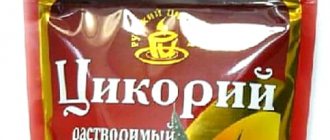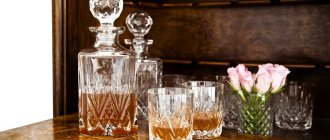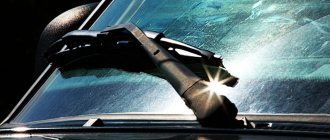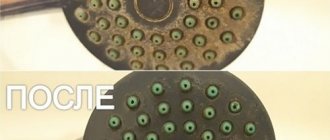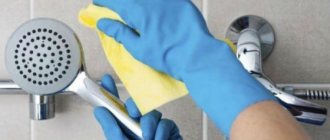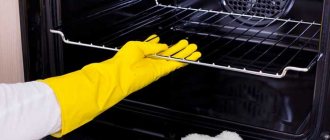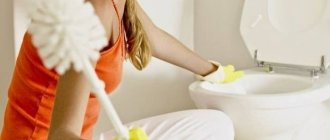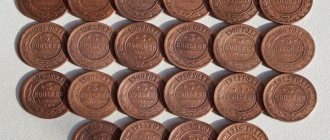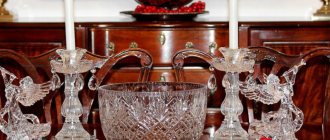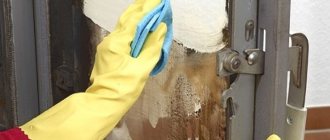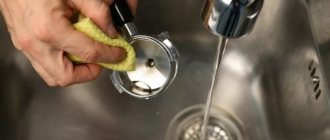Reliable old methods
Modern household chemicals are reliable.
These include special liquids and sprayers. But they require additional safety measures, working with gloves, or even a respirator. Allergies and a strong smell in the apartment are not the most pleasant consequences of using special products. It’s easier to focus on old, still Soviet methods. The following proven methods will help you successfully resolve the issue:
- Potato starch. It must be dissolved in water at the rate of 1 tbsp. spoon for 1 liter. Stir thoroughly until the grains disappear completely. Cold water should be used. You can even wash off dried dirt with this product.
- Salt. If you wash a window with its solution, it will shine. You need to add 30-40 g of salt to a ten-liter bucket of water. This solution is good for use in the fall, and then in winter the windows will freeze less. Salt can be replaced with chalk, but then the glass will have to be wiped with more force.
- Potassium permanganate. Its weak solution copes well with dirt and leaves almost no streaks.
- Laundry soap without dyes or fragrance additives. It needs to be finely chopped or grated, placed in warm water and stirred until foam appears. The soap solution removes dust and dirt well, but after washing you will need to wipe the surface with a dry cloth made of natural fabric.
- Kerosene. Although this is outdated, it is a very reliable tool. For 10 liters of water you will need 3 tbsp. spoons of kerosene. There are no streaks left after washing with this composition, but the smell will be present until the remaining active substance has completely evaporated.
- Ammonia. In pure or slightly diluted form, it removes glue residues, paint, grease stains, and soot well. If you add alcohol to water, it will be much easier to clean the windows.
- Vinegar. Using its solution, you can return tarnished glass to its former shine. For the same purpose, a washed window can be wiped with a soft cloth slightly moistened with linseed oil.
- Alcohol and glycerin in a combination of 1:20. Treatment with this combination prevents glass surfaces from fogging.
Remove stains and add shine
Any cleaning product will show good results only if it is used correctly. Frosted glass should be washed in the following order:
- Moisten the glass sheet with a soft cloth or sponge soaked in warm water.
- Using top-down movements, clean the dirt with a solution of laundry soap or dishwashing gel. Then remove the remaining product with warm water. If an industrial glass cleaning liquid is used, wipe the surface with crumpled paper or a dry cloth.
- Using the selected solution, old stains are removed if previous formulations have not dealt with them.
- Using a spray bottle, spray the glass with a solution of chalk or starch and leave it until dry.
- Use a dry cloth or crumpled newspaper to clean off the powder and rub the surface until it shines.
If the glass requires cosmetic care, a solution of chalk or starch is sufficient to clean it. Then the treated surface is polished.
What difficulties may arise
There may be a stain on it that will take some effort to clean. It can easily break under pressure. Then it is possible to lay the glass horizontally with the dirty side, or carefully select a cleaning liquid. Before physical cleaning, leave this liquid on dirty areas and only then remove it.
When cleaning the house, difficulties may arise with glass.
Sometimes the cleaning liquid is not selected very well and the glass literally “attracts” dirt to itself. Cleaning it is quite difficult and you don’t want to do it often.
From time to time you need to tidy up glassware that has a narrow neck. Warm water is poured into it, and a couple of drops of cleaning liquid or eggshells are added. In this state, the dishes are left for a while, then shaken and, making sure that the bottom and walls of the vessel are clean, you can rinse it and dry it.
How to wash windows with special products
Modern sprays, foams, and impregnated wipes help to quickly and streak-free clean windows from dust, raindrops, and fingerprints, restore shine, and create a protective film.
Choosing household chemicals
When choosing a glass cleaner, pay attention to the composition of the product. A spray containing ammonia is best for removing stains and stains.
The most popular and accessible are:
- Mr. Muscle - quickly removes even stubborn stains and dissolves dirt. It has a pleasant, unobtrusive smell that quickly disappears. The spray can be used to whiten plastic window sills and slopes. Disadvantage: too much expense. A bottle of 500 ml can be bought for 200–250 rubles.
- Frosch - copes well with greasy marks, removes dirt, dust, stains. Suitable for plastic surfaces, you can wash slopes, window sills, and frames themselves. Price per package, volume 750 ml, 200–220 rubles.
- Help – suitable for frequent, regular cleaning. It removes standard dirt (dust, greasy fingerprints) well and leaves no streaks or cloudy residue. But it may not cope with heavy pollution on the street side. Disadvantages: it has a pungent, poorly weathered “chemical” smell, it takes a long time to evaporate from the surface. Price from 50 to 80 rubles.
- Synergetic is a liquid for cleaning glass, mirrors, and any shiny surfaces. Made from plant ingredients and labeled “Eco”. Declared by the manufacturer as a hypoallergenic, biodegradable product. Helps quickly wash windows, remove stains, and restore shine. It has an antibacterial effect, a pleasant smell, forms a protective film on glass, and complies with SAN-PIN standards. A package with a volume of 500 ml can be purchased for 150–170 rubles.
- Clin Windows & Glass is one of the most economical and affordable products. It produces a dense foam that effectively removes grease and deposits from glass without leaving streaks. Price for 500 ml of product is 180–200 rubles.
How to wash properly to avoid streaks
The quality of cleaning depends on how well you can remove dirt and dust, as well as dry and polish the surface.
Cleaning windows correctly, even with special products, requires several stages:
Remove everything unnecessary, prepare cleaning compounds and tools. Wash heavily soiled glass with warm water and soap. Clean the space between the frames and the frames themselves. Treat the fittings. Change the water and wash again. To remove excess moisture, use a rubberized scraper or faux suede cloth. Spray the prepared glass cleaner onto the windows. Using a scraper, drive excess moisture down the glass using a Z-shaped motion.
Wipe the windows well with a soft cloth, paying attention to the corners and joints between the frame and the glass. Wipe the frames, slopes, and window sill dry. Rinse your handles
For a shine, buff the surface with newsprint or a microfiber cloth. If there is no special anti-fog agent, treat the windows with an alcohol solution of glycerin (1 tbsp per glass of vodka or 0.5 tbsp of ammonia diluted with water 1:1)
Store-bought compounds may not cope with heavily soiled windows without first treating the glass on both sides with water and regular soap. Street dirt is difficult to wash off and leaves streaks.
How to clean different types of glass
Depending on the purpose of the glass, the same cleaning methods show different results. Therefore, a little about how best to wipe different types of glass.
| Glass | Best ways |
| Window | Plaque can be easily removed using store-bought chemicals, laundry soap, ammonia, alcohol, and lemon juice. And dishwashing detergent helps to remove the protective film from a new double-glazed window. |
| Matte | Ammonia, vinegar, chalk solution (3 tablespoons per 1 glass of water), industrial chemicals are effective. Also, frosted glass is difficult to wipe dry. Therefore, methods that do not require rinsing are preferred. Such glasses are usually wiped with microfiber and paper, not cloth. |
| Dishes (glass and crystal) | Vinegar, ammonia and dish gels work best. The main tool is a sponge. And plaque and scale are removed by soaking the dishes in slightly heated vinegar. |
| Shower cabin | Store-bought drugs are the most effective. From home - soap and alcohol (not ammonia). Glycerin and store-bought water-repellent coatings, popularly known as “anti-drip”, are often used. |
Glass cleaning products
Glass surfaces are difficult to clean. The difficulty is to choose a product that will not only clean, but also will not leave streaks and scratches on the surface. So, let's look at the list of products for washing car windows, frosted shower walls, windows and other things.
Soap solution
You need to take a container, dissolve half a bar of soap there, and fill it with hot water. For quick dilution, you can stir the solution until
Sometimes vegetable oil or glycerin is added to make windows shine. It is vegetable oil that gives additional shine, and glycerin is a dirt-repellent component. For washing, you need to use a cloth purchased specially in a store, or a regular one, but one that does not scratch the surface. Apply the soap mixture directly with a rag, but the solution can be added to a spray bottle.
This option is not only simple, but also economical.
Dishwashing detergents
Dishwashing detergents are also suitable for glass, especially those in the kitchen. This could be an oven or stove door, as well as a table, kettle, or microwave. Here the stains are more complex than on windows: they consist not only of dust, but also of stains from food, grease, drinks and waste products. Therefore, dishwashing detergents are great due to their grease-removing properties.
Add a couple of drops of detergent to a container of water and stir until light foam appears. Next, use a rag, sponge or spray bottle to wet the surface. You can clean shower walls, even matte ones.
In the household chemicals department, buy a product specifically for glass. But they are not always universal, since what is suitable for a car will not always fit a microwave or glass kettle. In addition, it is more expensive in monetary terms.
Vinegar solution
Mix 1 liter of water and 1 tablespoon of vinegar. All this is stirred. If desired, you can add 1 more spoon. Vinegar is sometimes replaced with alcohol, you can also add glycerin or dissolve an aspirin tablet. Vinegar has a low concentration and it takes a lot of effort to clean something with it. But the result will be good.
If vinegar is mixed with water to clean a glass table, you can add essential oil to make it easier to clean without streaks. By the way, essential oil smells nice and will provide a pleasant smell in the room. Glycerin is added to repel particles of dust and dirt from the table. After cleaning, it is better to wipe the surface dry so that dust and dirt do not settle from the air and onto the wet surface. Also, if you remove moisture immediately, streaks will not form later.
Potassium permangantsovka
More often, potassium permanganate is used with boiled warm water or added to a mixture with water, glycerin, and vinegar. Housewives believe that potassium permanganate cleanses any glass. And indeed it is. Particularly suitable for tinted car windows.
Potassium permanganate is one of the oldest folk remedies. It really cleans perfectly, but, alas, it is powerless against grease stains. Potassium permanganate is added to the water in a small volume - a few drops will be enough. It is also convenient for cleaning shower walls. You can add a few drops of lemon juice to potassium permanganate - it will create an atmosphere of freshness, as it cleans the air.
Instead of lemon, it is forbidden to add citric acid - it is difficult to dissolve and grains can leave scratches.
Chalk mixture and bleach solution
Suitable mixture for cleaning frosted glass on shower stalls and room doors. It is necessary to grind the chalk so that there is enough for 2 tablespoons and three tablespoons of bleach. Add all this to a liter of running water.
Using a spray bottle, apply the mixture to contaminated areas. You cannot use rags and sponges for this; you need to moisten it generously. Then leave it for a while and let it dry. Remove dried residues with a soft cloth or paper towel.
Cleaning glass from the interior side
It is recommended to wash car windows in a clean room. If the weather is good, this can be done outside. For cleaning you will need:
Experts advise using microfiber cloth and specialized aerosols. To clean the inside of the windshield without streaks, it is important to wipe each area with a clean cloth. Among aerosol products, it is better to give preference to well-known brands intended only for washing car windows.
If chemicals are used, then after washing the surface must be wiped with paper or a rag. A rag is not suitable for these purposes, as stains may appear after its use.
You can use traditional methods - wipe the glass with a crumpled piece of newspaper or paper napkins (but they should not crumble so that pellets do not appear on the surface).
Ammonia is a traditional remedy. It is added to water and the glass is wiped with this solution. The ratio of components should be 1:1. This method will also help get rid of the unpleasant odor in the cabin.
You can hear from car owners that they use acetone for washing. But it is an aggressive, toxic substance that can only be used in small quantities to remove fat or other viscous substances.
Other traditional methods that can be used include:
- potassium permanganate;
- table vinegar;
- laundry soap;
- chalk solution.
You need to make a solution from these products and warm water. It is applied to the stain and washed off after a quarter of an hour.
Windshield cleaning chemicals
It is better to wash the windshield with special sprays for cars.
You can wash the inside of your car windshield with a sponge and regular soap solution. But this option is best used for regular prevention or to eliminate minor opacities.
Removing heavy marks or treating clean glass should be done at least once a year using stronger detergents. You can purchase expensive formulations for this purpose, produced as special car cosmetics. It is believed that only they are able to cope with specific automobile pollution. But this is true, rather, for external surfaces, which are more often exposed to the external environment and gasoline and oil.
Simple detergents are also suitable for cleaning the inside:
- Mr. Muscle;
- Second;
- Aquagel;
- Liqui Moly.
For interior cleaning, it is more convenient to purchase detergents in bottles with a sprayer. They more accurately dose the amount of liquid applied to the glass and evenly cover the entire surface. The use of sprays allows you to avoid getting large amounts of cleaner on foreign objects inside the car.
Industrial products can be produced with or without the addition of ammonia. There is an opinion that it is harmful to car seat upholstery and plastics and permeates the interior with an unpleasant odor. But this is true for high concentrations of ammonia, and small doses are added to the cleaners. According to numerous reviews from car enthusiasts, preparations containing ammonia act on pollution more effectively than usual.
How can the inside of the glass in a car get dirty?
youtube.com
And really, how can you dirty the windshield or any other glass in a car from the inside? After all, it’s unlikely that we often touch it, lean against it, draw patterns on it with our fingers, allow pets to snuggle up to it from the inside, and so on... Maybe this has something to do with smoking? Yes and no.
In fact, for a greasy, dirty coating to appear on the glass, it is enough just to be present in the car. The fact is that under any circumstances and at any temperature the following will settle on it:
- moisture from breathing;
- particles of saliva;
- skin scales;
- hair or fur if you carry pets in the car;
- and if they smoke in the car, then unpleasant-smelling tars, yellow nicotine residue and other elements of the decay of tobacco products will be added to this.
Causes of pollution
Reasons for frequent contamination of frosted glass surfaces include:
- Dried drops of water during water procedures, if the glass is in the bathroom.
- Soot and grease settling on matte surfaces of furniture and kitchens.
- Remains of street dirt and exhaust gases, if it is placed on a balcony or loggia.
- Dust settling in living rooms, children's rooms or bedrooms.
Cleaning frosted glass is not an easy task. In its production, the top layer is treated with a special compound, which gives the glass a dull appearance and an uneven texture. Detergents containing abrasive components can simply destroy this coating. Scrapers and newspaper cannot cope with dirt. This problem can only be solved using gentle means.
Using household chemicals
You can wash frosted glass in interior doors using household chemicals, but not all of them. Recommended chemicals:
- To clean cloudy glass surfaces, you can use regular dishwashing detergent: the surface is treated with a solution, washed off with warm water and wiped dry. To clean glass inserts with detergent, it is advisable to use a soft cloth. If there are dried stains, pre-soaking is required.
- You can also clean frosted glass inserts with sprays containing alcohol or acetone. These substances dissolve grease stains and glue marks well. Such contaminants should be removed before washing the glass completely. Use products containing alcohol or acetone with caution, as they have a negative effect on the silicone door seals.
- When washing frosted glass elements, it is prohibited to use products containing acids, alkalis, ammonia and gasoline. Cleaning abrasive powders and metal brushes are also prohibited: they will scratch the matte glass surface. To remove difficult stains, it is good to use a rubber spatula.
It is important to know!
Before you begin the procedure for cleaning frosted glass from traces of grease, you should familiarize yourself with the following information:
- Frosted glass has a rather rare feature of its structure, which consists of a special surface coating. Due to this, it becomes so difficult to wash off a greasy stain on frosted glass. This is due to the fact that microparticles of any substance in contact with the matte surface begin to penetrate into the microscopic recesses of the matte coating, which prevents 100% cleaning using standard detergent components.
- Washing old grease stains on such glass is much more difficult than fresh stains. Therefore, it is recommended to be more attentive to the care of frosted glass and try to remove all dirt as soon as it appears.
- When using any cleaning component, first of all, you need to take care of preserving the skin of your hands and the respiratory system, so it is recommended to carry out the treatment procedure with rubber gloves, opening all windows and doors, thereby ensuring free access of oxygen.
- Before applying a specific cleaning agent to the contaminated area, you should first test on an inconspicuous area of the glass for the joint interaction of the components, and if nothing happens, then you can safely use the selected ingredient to eliminate the full treatment.
Necessary tools and tools
In autumn and spring, many housewives traditionally do general cleaning, which includes washing windows.
However, quite often you can hear calls to abandon the almighty household chemicals in favor of more environmentally friendly home remedies.
After all, ready-made glass cleaners sometimes contain substances that are unsafe for health.
By the way, additional information on how to properly wash windows will not hurt you even if you are used to using ready-made products for this purpose. Sometimes, even after treatment with a special compound, unsightly stains remain on the glass.
It’s good when, at any time of the year, every window in an apartment or house sparkles with cleanliness. And, whatever the design of the window in the kitchen or bedroom, perfect cleanliness will be its best decoration.
- Before washing windows, put on rubber household gloves so that intense contact with moisture and detergents does not cause damage to the skin of your hands.
- It is better to choose microfiber or artificial suede cloths for washing window glass and plastic frames: they perfectly absorb moisture and dirt particles. But for washing wooden frames, a cotton rag is useful.
- When washing windows, it is very convenient to use an accessory such as a water squeegee - it is used to remove excess detergent or water from the glass. They are equipped with rubber blades that glide well over the surface of the glass.
- A holder with a coat for cleaning windows, a distant relative of the familiar mop, will also be useful. A soft, but moderately abrasive coat will easily remove old stains, bird droppings and other stubborn stains from glass.
Procedure
- We pour clean water into the bucket, arm ourselves with a napkin and, squeezing it lightly, wipe the glass, removing the main accumulations of dirt and dust from them. You don't need detergents at this stage. Let the stains remain on the windows; you will deal with them a little later.
- We replace the dirty water in the bucket with clean water and now wash the window frame. If it is very dirty, you can add a little shampoo or dishwashing gel to the water - these products will not cause much harm to the wooden frames.
- A holder with a fur coat will help you deal with dirt much faster. Then we change the water again and thoroughly wipe the frames again to the last corner.
- Let's get back to the glass again. We apply a ready-made glass cleaner to them or treat them according to one of our “grandmother’s recipes” (see below). If we are dealing with a cleaner, we remove its residue with a screed, and then wipe the glass with a synthetic cloth.
- If we use “grandmother’s recipes,” then, if necessary (see the information published below), we wash them off with clean water and remove any remaining moisture with napkins.
- The finishing touch is to wipe the glass with crumpled old newspapers. There will be no trace left of stains, and the glass will begin to shine beautifully.
Removing common dirt and plaque
In this case, the use of chemical compounds is not recommended. Cleaning is done using a soap solution and a piece of cloth. You can also use special napkins and rags that will make washing more effective and reduce the likelihood of streaks.
After treating the glass, it is recommended to apply “Aquagel” - a special product that protects the coating from dirt and dust. The “Secunda” aerosol, a “Mr. Muscle” type detergent, and glass cleaning solutions containing alcohol will help clean the windshield of deposits. Any of these preparations is applied to the glass and the coating is wiped off with a special rubber rag.
You can also use regular alcohol diluted in water. The washing procedure is as follows:
- The diluted substance is carefully applied to the surface.
- Stains are removed.
- Wipe the surface with a napkin or rubber scraper.
It is better to remove oil or fat deposits immediately. Ammonia and foam detergent are suitable for this. The selected substance is applied to the stain and then wiped off with a wad of newspaper or an artificial suede cloth.
How to wash
How to clean frosted glass from grease stains? It all depends on the age of the pollution. If the stain is fresh, then simple methods will do. Sometimes you have to fight the old ones in several stages.
Fresh spots
How to clean frosted glass on doors? There are several remedies that can be prepared at home.
- A solution of ammonia. Dilute two tablespoons of the substance per liter of water. Soak a cloth in the solution and rub the dirty areas. It is necessary to wipe frosted glass on both sides in this way. After this, wipe them with a dry cloth. Be sure to ventilate the room well after using ammonia.
- Vinegar solution. It must be prepared in the same way as alcohol. You can add salt to the mixture. Use a glass cleaner.
- Laundry soap grated and dissolved in water.
- Potassium permanganate.
- Product for the care of metal-plastic windows. It is gentle, so it will not damage the matte coating. It cleans everything well.
- Acetone.
- Baking or soda ash.
It is better to take a suede flap as a rag. It will not slip on the surface, which will simplify the cleaning process. You can also use a rubber spatula.
Typically, such products work well to remove greasy stains from fingers, especially if they are quite fresh. But sometimes paint, oil and grease (if the door is located in the kitchen), and glue from tape that could be used to glue something gets on frosted glass. These contaminants are difficult to remove, especially if they have become old. In such cases, special methods are required.
Before cleaning frosted glass from grease stains, take care of the safety of the silicone seals. So that they do not suffer from aggressive mixtures and cease to perform their functions, you can seal them with paper or polyethylene.
Apply the product directly to the stain, and when rinsing off, touch the entire glass. This way, more of the cleaning mixture will reach the oily areas and will be more effective.
Old traces
How to clean frosted glass from greasy stains obtained in the kitchen? Try methods suitable for fresh stains first. If they do not help, proceed to the following methods.
Chalk mixture. How to cook it? Take two tablespoons of crushed chalk and stir in one liter of water. Pour the resulting mixture over the glass. You can do this using a spray bottle. After the glass has dried, remove the chalk ball using paper, a stiff cloth or a scraper.
Do this carefully so as not to damage the glass. This product is particularly good at removing glue. Bleach solution
It is prepared and used according to the same principle as the chalk mixture. Dishwashing detergents. They cope well with grease, and do not contain components that damage frosted glass. But their use also has a drawback - a large amount of foam. It will take a lot of effort to wash it off. "Mister Muscle". This product is capable of combating quite complex stains. Many praise it for its effectiveness and safety in use. Mixtures Ajax, Pril. They work well, just remember that the base must be thoroughly wiped with water. "PROFOAM 3000". Use it to remove traces of tape and stickers. Shampoo for carpets. Steam cleaning tools. These include irons, vacuum cleaners and other appliances. With their help, frosted glass is treated with steam; contaminants on it are dissolved under the influence of humid air and high temperature. If the device also has a continuous suction function, then cleaning will be perfect. If there is no such function, you can follow the steam treatment by wiping the glass with a damp and then a dry cloth.
To achieve maximum effect, it is worth using several products. Just don’t do it all at once, but one at a time. First, thoroughly soak the dirt on the glass. To do this, use well warm water. Leave everything like this for a few minutes. Next, you can apply dishwashing detergent or chalk solution. Afterwards, wipe the glass with alcohol or an alcohol-containing product purchased at the store. According to reviews, regular alcohol helps no worse than ammonia, and it is safe for others. Some people use window cleaning liquid to complete the operation.
Step-by-step instruction
To clean frosted glass, just follow a few steps:
- Soak a sponge or soft cloth in warm, clean water.
- Apply cleanser to stained areas and scrub lightly.
- The final step is to remove the residue and polish with a dry cloth.
Wash the frosted glass on the doors as carefully as possible: do not allow strong drips, do not press on the edge, trying to clean a thin strip along the strip. Otherwise, it’s easy to damage the door, squeeze out or break the glass
A fresh stain is easier to remove. Therefore, it is recommended to treat the matte surface immediately.
How can I clean frosted glass?
There are several effective means to clean the surface of doors from dirt. Some products can be purchased at a specialty store, while others can be made independently.
The most effective means
Glass cleaning products contain an alcohol solution. It not only removes grease stains, but also disinfects the surface. Depending on the type of contamination, you can use one of the following means:
- "Mister Muscle". Suitable for light dirt, dust removal and pencil drawings.
- GT-20. The detergent is more aggressive, so it is advisable to use gloves and ventilate the room. Designed for polishing surfaces and removing stubborn dirt from the pores of glass.
- Pril. A soft gel product that perfectly removes grease and old dirt. Apply the gel in a thick layer and leave for 5 minutes. Then wipe with a damp sponge and remove any remaining dirt.
- Ajax. This product is added to a steam cleaner and removes dried dirt using high temperatures. In addition, hot steam disinfects the surface and does not spoil the varnish on the doors. Remember that glass does not like high temperatures.
- Gels for washing dishes. If the door is stained, use non-abrasive cleaners such as dish gel. But the method has its drawbacks. If you do not rinse the surface well and a small amount of product remains on the glass, then when it dries, the glass will be covered with a white film or streaks. To obtain a perfect, shiny surface at the end of cleaning, use napkins or cotton cloth.
- Nail polish remover or acetone. This option is not bad, but you should remember that if acetone gets on the paint or varnished surface, bleached areas will form on it.
- Alcohol or vodka. Back in the Soviet years, our grandmothers and mothers used alcohol to wipe glass and display cabinets. Vodka can degrease any surface, including rough ones. Be sure to make sure that the alcohol solution does not get on the rubberized inserts: alcohol corrodes the material, which then becomes quite fragile. Use ammonia. It can always be found in the first aid kit and, moreover, it is quite economical.
Before purchasing a chemical, read what is written on the back of the package. There is a category of funds that have a red triangle sign. This means that the use of this type of liquid in domestic premises is prohibited.
Folk remedies
During the Soviet years, when nothing was sold on the shelves, our women found a way out and made solutions themselves.
The most common method is to use a vinegar solution. To do this, add vinegar to cool water until a characteristic odor appears. Put on gloves and treat the surface. Vinegar cleanses fingerprints and eliminates unpleasant odors. Please note that this method is not advisable for asthmatics and people suffering from allergic reactions.
The best way to check the cleanliness of the material is to rub it with your finger. If you hear a pleasant crunch, it means the surface is perfectly clean.
Other popular windshield wipers
In addition to the car glass cleaning products presented in the previous section, there are currently also a large number of their analogues on the market. Their effectiveness varies and depends on the composition, price, as well as the logistics component, that is, in some regions of the country a particular product may or may not be available for sale. Thus, the following glass cleaners are popular among domestic car enthusiasts:
- AREXONS Scheiben Schaum;
- ARMOR ALL Glass Cleaner;
- ARMOR ALL Auto Glass Cleaner;
- BBF glass cleaner;
- CARAMBA Glas-Reiniger;
- CARAMBA Glasreininger-Schaum;
- CRC Glass Clean;
- GUNK Green Concentrated Cleaner;
- GUNK Glass Cleaner with Ammonia;
- KANGAROO Fine Glass;
- KERRY KR-920, foam glass cleaner;
- KERRY KR-520, glass cleaner;
- LONG WAY Glass Cleaner;
- RAVENOL Glasklar;
- REX Scheiben-Klar;
- PINGO BIO-GLASREIN MIT BIO-ALKOHOL;
- RUNWAY GLASS CLEANER;
- SHELL Window Cleaner;
- SONAX Scheiben Schaum;
- SOFT99 Glaco Glass;
- SONAX Xtreme NanoPro Scheiben Klar;
- STEP UP Glass & Plastic Cleaner Film Remover;
- WILLSON cleaner-polish with diamond chips;
- WURTH active glass cleaner.
Naturally, this list can go on and on. But the assortment on store shelves depends, among other things, on the logistics component. Therefore, in some regions of the country, this or that product may not be available for sale precisely for this reason.
Folk recipes
Not everyone trusts industrial “chemistry”, and sometimes it is simply not at hand. How else can you clean frosted glass?
- Vinegar solution. Prepared in warm water; concentration is weak. It is enough to remove minor contaminants, and it will completely replace the same “Mr. Muscle”. But it is used only after cooling.
- Chalk solution. The effect is similar to the use of store-bought drugs such as “PRIL”. Removes drops of glue and grease well. The recipe is simple - 2 tbsp per liter of water. spoons. After thorough mixing, the mixture is strained and the solution is applied to the surface by spraying. A simple household spray bottle will do. After drying, a napkin, soft cloth, or even a sheet of paper removes the chalk, and with it the dirt.
- Ammonia solution. Diluted in the proportion of a tablespoon/glass. It perfectly removes small stains and stains on frosted glass.
Popular concentrates
In addition to ready-to-use glass cleaners, you can find so-called concentrates on sale, that is, products that must first be diluted with water. This is done, firstly, to save money (since the amount of ready-made and usable cleaner will be larger, and its price will be lower), secondly, to regulate the cleaning ability, and thirdly, for the convenience of using such preparations in professional car washes, where they are used in large quantities.
Let us give, as an example, several popular concentrates that are recommended for purchase by car washes and various craftsmen, including car washes on a professional basis.
Liqui Moly Scheibeh-Reiniger-Super-Konzentrat . In everyday life it is also known as Liqui Moly super concentrate. Sold in a 250 ml bottle. Diluted in a ratio of 1:100. The kit includes a 25 ml dispenser, which makes it easier to work with. Real tests have shown that the cleaner copes well with even the most contaminated areas. In particular, it can be used to easily wash away dried insect residues, dust, dirt, wax, silicone, diesel soot, various oily deposits, and so on. Cleaner-con can be used all year round; it can be mixed with any anti-ice products, that is, so-called glass anti-freeze agents.
Arexons . Produced by the company of the same name in Italy. It is a detergent concentrate that must be diluted in a ratio of 1:100. Sold in a 250 ml bottle. The bottle comes with a 25 ml dispenser, which makes it easier to work with. It has a pleasant smell, the instructions are presented in Russian. Real tests of this concentrate have shown that it copes well with oily stains on the surface of the windshield. As for dried dirt and insects, in some cases it is necessary to give some time for the reagents included in its composition to soften the dirt. And after that it is not difficult to remove them.
K2 Nuta Max . Produced by K2 in Poland. The concentrated cleaning product is sold in a 75 ml bottle and must be mixed in a ratio of 1:200. Real-life tests have shown that the product is quite effective, has a pleasant smell and produces a dense, thick foam. Unfortunately, there are no instructions in Russian. Works very well on oily deposits, dried dirt and insects. Accordingly, this concentrate is definitely recommended for purchase by both ordinary car owners and car wash owners and administrators.
It is also worth noting several more popular and fairly effective concentrated glass cleaners:
- SCT Scheiben-Reiniger . Packaging 250 ml, proportion 1:100.
- Wurth Rapid Windscreen Cleaner . Packaging 32 ml, proportion 1:90.
- DEX . Produced by Russian. One tablet of the product must be dissolved in 5 liters of water.
- "Summer" . Produced by Russian. Packaging volume 70 ml, proportion 1:150.
Folk recipes
There are several folk remedies that will help clean the matte surface on glass.
Ammonia
The most popular cleaning agent for coated glass is ammonia. It is used to prepare a detergent that effectively fights almost any stain. To prepare the solution, add 10 milliliters of ammonia to a liter of water. The mixture is sprayed with a spray bottle and rubbed with a cloth. After this, the wiped coating is washed with cold water.
Vinegar 9%
Experts advise using vinegar liquid to clean glass. It will help get rid of ordinary dust and wipe away stubborn greasy stains. To prepare the solution, add a tablespoon of apple cider vinegar to a glass of water. Then soak a rag in the solution and wipe the door with it. To prevent the coating from smelling like vinegar, it is washed again with soapy water.
Baking and soda ash
Sometimes vinegar and ammonia do not help clean the surface of the glass from dirt and you have to use soda ash and baking soda. It is added to water in a ratio of one to five, after which the matte product is treated with the soda mixture. You can also not dissolve the soda, but simply rub it into the surface, rinse with water and wipe with a dry towel.
Powdered chalk or starch
If there is a lot of dirt on the glass surface, you can use starch or chalk powder from which a cleaning solution is prepared. To do this, add 45 grams of the substance to 500 milliliters of water, after which the liquid is thoroughly mixed. Then soak a cloth in a container with the mixture and wipe the glass with it. Remains of chalk are wiped off with a regular dry sponge or rag.
Denatured alcohol, vodka and cologne
An effective means for cleaning dirt can be prepared from cologne, regular vodka and denatured alcohol. All components are mixed in equal quantities. Then the liquid is evenly applied to the dirty surface and left for 10-15 minutes to soak in the dirt. After this, use a rag soaked in water to wipe off the remaining dirty marks.
Steam
Sometimes people don't want to use cleaning fluids, so they steam the frosted glass instead. For this, a special steam generator is used, which not only removes dirt, but also degreases the door. Steaming should last for five minutes. Then wipe the cleaned surface with a dry cloth to remove any remaining moisture.
Chalk mixture and bleach solution
When cleaning matte surfaces, it is recommended to use a solution made from bleach. It is able to clean it of dirt and absorbed fat. To create the mixture, add 20 grams of lime and 25 grams of grated chalk to 800 milliliters of water.
Potassium permangantsovka
To combat old stains, you can use a manganese solution. When preparing such an effective manganese mixture, 55 grams of manganese are added to a liter of boiled water. The solution is stirred until it turns a dark reddish color. Moisten a sponge in the prepared liquid and wipe the surface of the door glass with it.
What not to clean at home
There are several products that are contraindicated to use when cleaning glass coverings.
Strong abrasive compounds and materials
Sometimes hard abrasive materials are used to clean products from dried dirt. You should not use them when cleaning glass, as their thick coating can damage the glass surface and leave scratches on it.
Products that contain silicone, any acids or alkalis
There are times when people try to clean door glass with products that contain silicone, alkalis and acids. However, such liquids cannot be used, since the components from their composition can corrode the matte finish.
Hard scrapers and spatulas
Spatulas and scrapers can be used to clean products with durable metal or concrete surfaces. It is prohibited to clean glass with such tools, as mechanical impact will damage the matte coating.
Strong solvents and detergents
Strong detergents containing solvents should not be used. They contain substances that will damage the surface of the glass.
Proven ways to clean a mirror without streaks
There are different ways to clean mirror surfaces from dust and dirt. Let's consider those that are used for any type of reflective glass.
Mirror in the bathroom
Increased humidity levels contribute to the gradual process of fading of the mirror. To prevent this phenomenon, you need to use a special mixture based on melted wax and turpentine. The solution is prepared at a ratio of 1:2 and applied to the back of the glass. To prevent fogging, the contour of the hanging mirror is covered with plastic tape. Another option is to coat the back of the accessory with oil paint.
Step-by-step washing sequence:
- Wipe with a dry cloth.
- Wiping with a damp (not wet!) cloth.
- Rinsing the mirror cloth.
- Treatment with cleaning agent.
You can add shine with a proven folk remedy: sprinkle with lemon juice and leave for 10 minutes, wipe with a dry piece of gauze. Citric acid dissolved in water will remove old stains.
Raw potatoes cut in half will effectively remove dirty deposits. The reflective glass is wiped with half a vegetable, then rinsed and wiped dry. To add shine, soak a cotton cloth in milk and polish the surface.
You can wash a dull mirror at home and return it to its original shine by diluting the blue in water, soaking a piece of fabric in the solution, washing the cloth and then wiping it dry.
Table vinegar essence mixed with water in equal proportions will help remove limescale stains. After treatment with the mixture, the reflective glass should be treated with a soft, dry cloth.
To add shine to your bathroom, use ammonia. If you wipe down the shower stall and polish it with sheets of newspaper, you can remove soap smudges that remain after taking a shower.
To clean mirror surfaces, use wet wipes - wet wipes leave soapy streaks.
